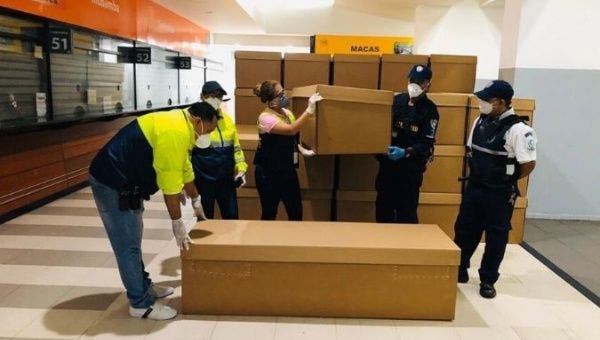
Latin America is on the front line in the struggle against imperialism; class struggle is acute. Advances in Ecuador and Bolivia have been halted and reversed. Brazil has been seized by utter reaction. Cuba’s and Venezuela’s achievements are constantly threatened but their examples show the oppressed peoples there is a way forward.
Ecuador
From 2017, President Moreno’s new government capitulated to pressures by the US state and its money lenders to reverse at any cost the social well-being policies introduced by President Correa. A request for an IMF loan produced demands for cuts in wages, benefits, fuel subsidies and tariffs to make savings of $1bn. In October 2019, Moreno imposed a national state of emergency to force through some of his austerity measures; state forces killed protesters. Criminalisation and arrests of leaders of Moreno’s opponents followed. On 21 July, Ecuador’s National Justice Court (CNJ) ratified an eight-year sentence against exiled former President Rafael Correa and 20 other officials, for allegedly financing his Alianza PAIS’s (AP) political campaigns with money from businessmen who won state contracts. In fact, Moreno and his associates have been shown through documents released by Julian Assange to be involved in the very corruption they have falsely accused Correa of promoting. The judgement against Correa came one day after Ecuador’s electoral authorities suspended ‘Fuerza Compromiso Social’, the party with which Correa would otherwise certainly win next year’s elections. This repeats the methods used against President Zelaya in Honduras in 2009 and President Lugo Méndez in Paraguay in 2012, and both President Rousseff in 2016 and presidential candidate Lula in 2018 in Brazil.
Moreno’s kowtowing to the debt market has pushed Ecuador near to the top of Latin America’s tragic rankings for recorded Covid-19 death rates, with a figure of 305 per million population. In mid-July, only Peru with 394, and Brazil with 366, recorded more deaths per million population than Ecuador. The dreadful situation in Ecuador, can be contrasted to Argentina, where President Fernández’s new government has imposed strict preventive measures and has suffered a much lower reported death rate, 48 per million. Where socialism is the principle of government, as in Venezuela, recorded deaths have been exceptionally low, at 3.6 per million people. In Cuba, where socialism holds power, the reported Covid-19 death rate is 7.67 per million. The Covid-19 crisis has shown how socialist planning, as a general tool, is the basis for an alternative economic system if humanity is to avoid capitalist barbarism. By contrast, British and US imperialist states recorded death rates in mid-July were 678.6 and 422.3 per million respectively.
Planning for the market or planning for the people?
These facts demonstrate the distinction between state-organised planning in defence of the working class, and the imperialist state ‘plans’ which see public money thrown, as a short-term gamble, to market players. In those states where the masses have gained or imposed some position of political control, the drive is towards planning with practical worker participation. In those states where workers have been cudgelled or bribed into submission, planning is nothing more than the transfer of anticipated future taxes on workers to existing property owners.
It is not simply ‘planning’ in general that defends Cubans and Venezuelans, it is a specific form of planning; planning designed in the interests of, and run by, the masses. It would be foolish to imagine that imperialist states intend to plan in the interests of the working classes. Imperialist planning is based on the principle of the preservation of private ownership of the means of production, so it aims to preserve the very system that has produced the present crisis. This is why there has been such a battle within the ruling class about the nature of lock downs and their timing: their ‘plans’ have to aim at returning to market ‘normality’, as soon as it can be got away with.
Debt as a death grip
In states such as Argentina or Ecuador, exploited by imperialist money funds, debt restructurings are the order of the day. Such states are unable to repay their foreign debts as Covid-19 accelerates the already falling or negative growth rates of the last three to six years across Latin America. Ecuador is under pressure to weaken the terms it has offered to its $17.4bn creditors. Some have resisted Ecuador’s proposal made in July. Bondholders like Ashmore and BlackRock agreed to their ally Moreno’s proposal to repay all but 9% of capital Ecuador owed, with further relief in the next four years and perhaps thereafter. Clearly, the country can’t repay its debts with Covid-19-induced falls in output, and falling oil prices. However, other bondholders, with over a quarter of the debt claims, are demanding higher returns, tied to a call for new IMF arrangements as background guarantees.
Argentina
The same story is being repeated in Argentina. The pro-imperialist government of Mauricio Macri left the 2019 incoming government of Albert Fernández with $323bn of debt;it inevitably defaulted on interest payments in May. $65bn of this debt has to be negotiated now. Some creditors want to remove international agreements for debt collection made after Argentina’s last default. BlackRock, Fidelity and Alliance Bernstein are currently demanding 57cents per $US1 debt as Argentina offers 49.7cents. Argentina suffers 50% inflation and a 30% poverty rate, and the GDP has contracted by about 15% in a year.
So in the middle of the Covid-19 crisis, the international money lenders are fighting to squeeze as much blood as possible from the workers of both Ecuador and Argentina. Nothing could demonstrate better why the imperialist fraud of ‘development finance’ has to be ended, the theft of public property has to be reversed, and the abolition of all debts to imperialist states must be demanded and achieved.
Alvaro Michaels




